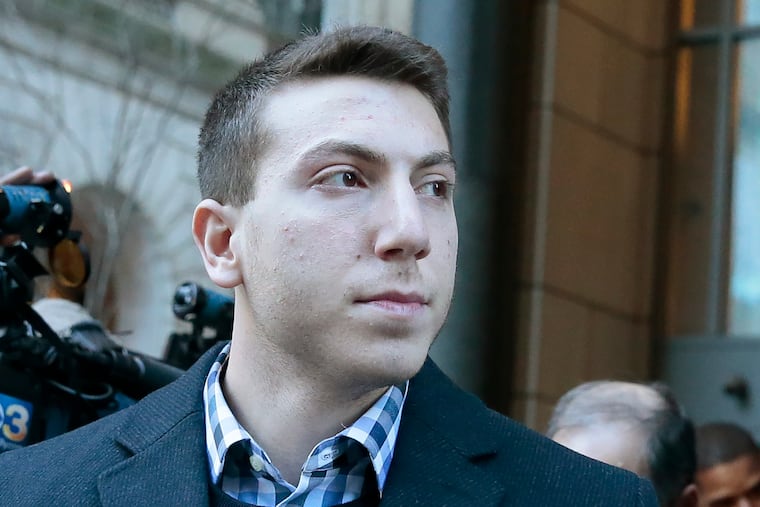Ex-Temple frat president Ari Goldstein is found guilty of attempted sexual assault in one case, cleared in another
Ari Goldstein, 23, of Wrightstown, Bucks County, was convicted of attempting to sexually assault a woman in his bedroom at the frat house, but found not guilty of forcing another woman into an unwanted sex act on a separate encounter.

A Philadelphia jury on Tuesday delivered a split verdict in the sexual assault trial of the former president of Temple University’s Alpha Epsilon Pi fraternity, convicting him of attempting to sexually assault one woman in his bedroom, but clearing him of allegations that he forced himself on another.
The panel of eight women and four men reached its decision against Ari Goldstein after about six hours of deliberations over two days.
Goldstein, 23, of Wrightstown, Bucks County, did not visibly react as the foreperson read the verdict. He was placed in handcuffs and taken immediately into custody until his sentencing hearing in May.
Minutes after the case ended, Goldstein’s attorney, Perry de Marco Sr., stood outside the Stout Center for Criminal Justice and repeated what had been a pillar of his trial defense: He asserted that the women — each of whom testified that Goldstein had tried to force her into sex acts against her will — had put themselves into “a compromising situation” by partying before voluntarily entering Goldstein’s room at the frat house.
“The way everybody looks at these cases ... they always talk about the responsibilities of the man, but never the responsibility of the victim to not put yourself in a dangerous position,” de Marco said. “You just have to look at your common sense, and with freedom — sexual freedom among women — comes a responsibility to exercise it wisely. And that did not happen in either one of these cases.”
Assistant District Attorney Zachary Wynkoop pushed back on that argument, saying the two women had simply been “living their lives as young college-aged students.”
“Going to a fraternity party should not be a dangerous situation,” Wynkoop said. “Going dancing with your friends should not be a dangerous situation. Being a college-age student should not be a dangerous situation. And to say that what they did was wrong is jaw-dropping.”
The verbal sparring marked the culmination of a closely watched case, one that led to the suspension of Goldstein’s fraternity in April 2018.
District Attorney Larry Krasner said in a statement that the verdict was a “triumph for a society that is increasingly trying to ensure justice for victims of sexual assault and rape.” He also praised Goldstein’s accusers, saying they “endured unfair and untruthful assaults upon their character by the defense in court.”
The two women sat next to each other in the courtroom gallery as the verdict was read, hugging and holding hands. The Inquirer does not identify victims of sexual assault without their permission. Both left without commenting.
Goldstein’s relatives also declined to comment. They had filled the courtroom during three days of testimony last week and did so again for the verdict.
Krasner’s office said the standard sentencing guidelines called for a prison sentence of at least three years for Goldstein, although Wynkoop declined to say what punishment prosecutors might seek.
Goldstein had been accused of using physical force to try to push his accusers into sex acts after they told him no.
One woman testified that when she was a Temple freshman in February 2018, Goldstein attempted to force her into a sex act before she managed to leave his room. For that, Goldstein was convicted of attempted involuntary deviate sexual intercourse, attempted sexual assault, and indecent assault.
The other woman testified that she and Goldstein were having consensual sex in his room in November 2017, when she was a Temple junior, but that she told him to stop when he pressed his arm on her collarbone and put his fingers down her throat. She testified that Goldstein then asked her to perform oral sex on him and forced her to continue doing so even after she said no.
Jurors decided that Goldstein’s conduct in that encounter did not amount to a crime.
Wynkoop told jurors during his closing argument Friday that the women were clear and consistent in telling Goldstein to stop.
De Marco contended that the actions were not criminal and that the women lived lives full of “rampant sex, drug use, and endless drinking.” One of Goldstein’s accusers, he said, had previously had rough sex with Goldstein and used him as her “sex boy.”
“We know in the real world, ‘no, no’ has many shades of gray,” said de Marco.
Goldstein did not take the stand during the trial. Three people testified on his behalf as character witnesses.
Goldstein was arrested in May 2018 and charged with the attempted assault against the freshman. The other woman reported her allegations to police after that set of charges had been in the news.